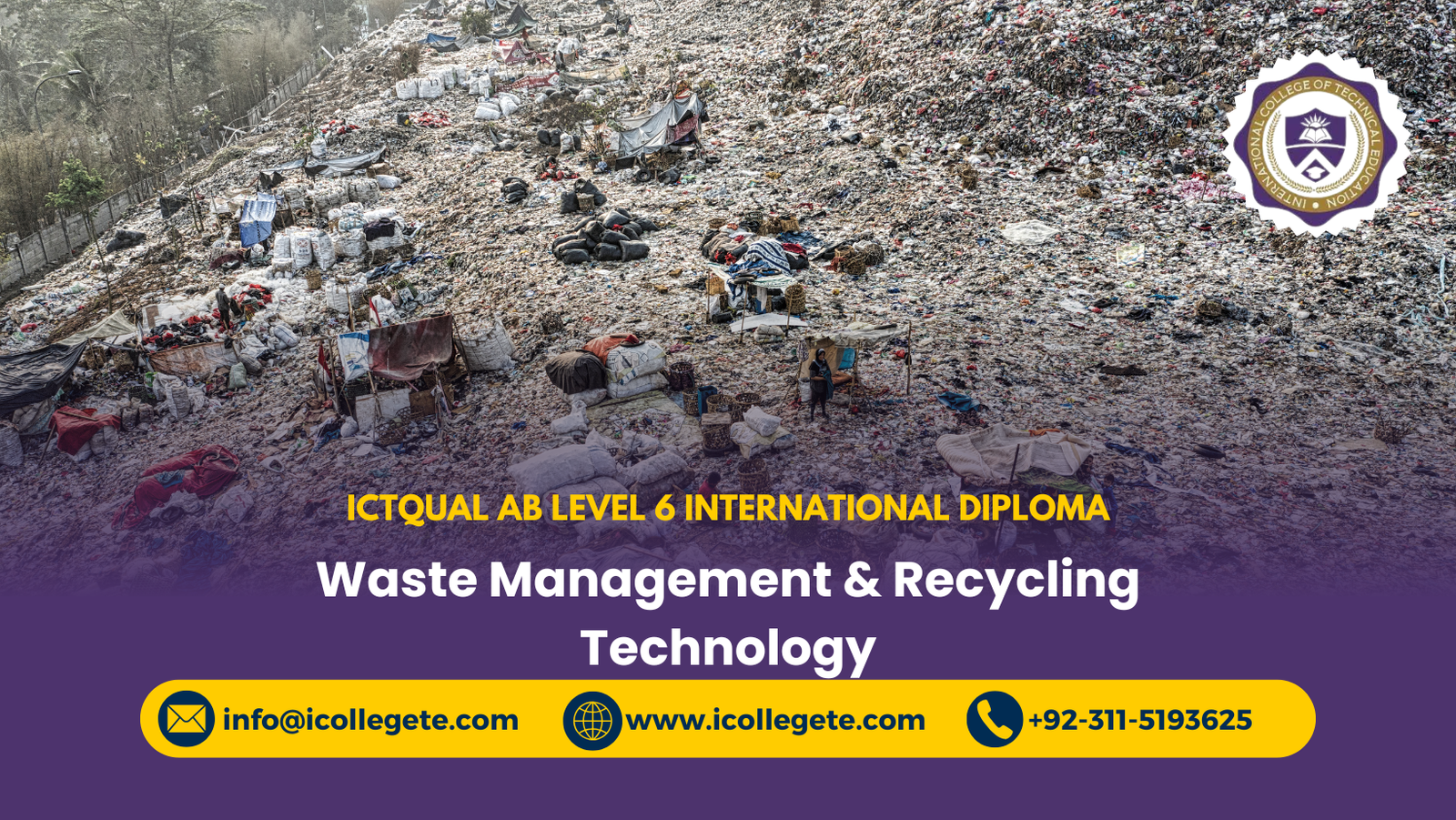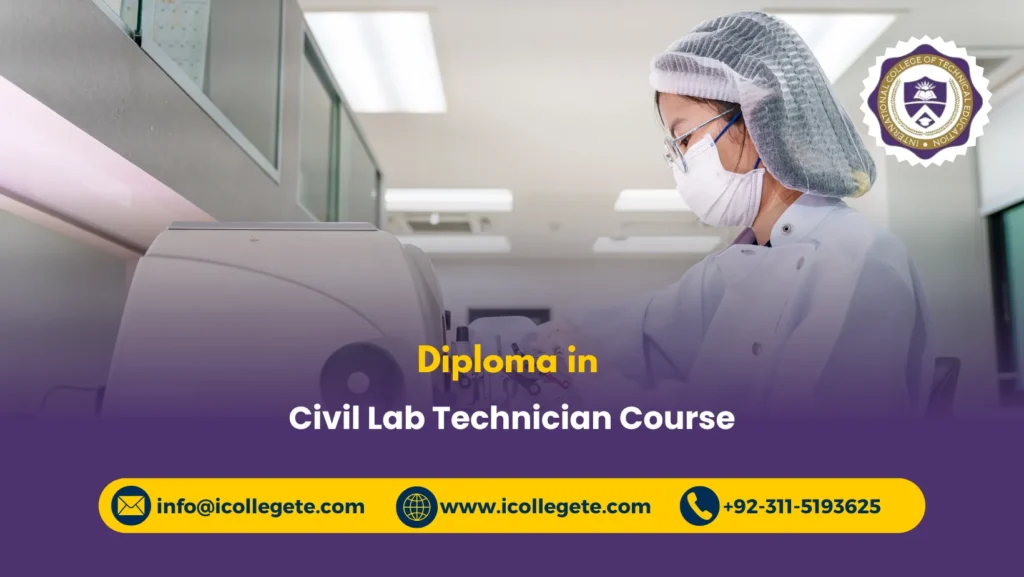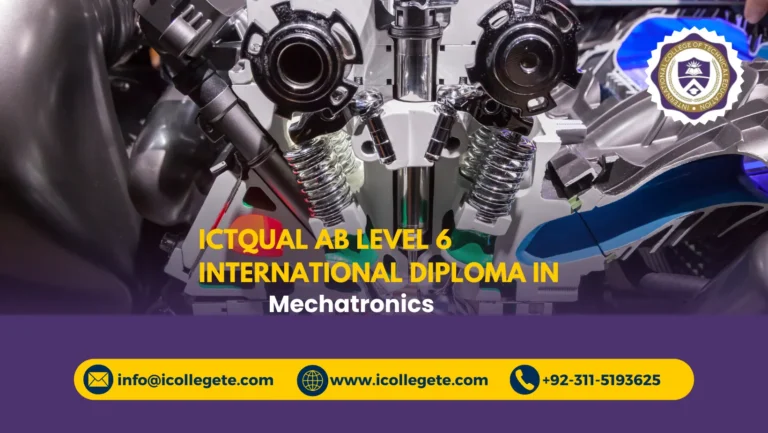The ICTQual AB Level 6 International Diploma in Waste Management & Recycling Technology is a prestigious three‑year, 360‑credit qualification designed to prepare learners for leadership roles in one of the world’s fastest‑growing environmental sectors. ICTQual AB Level 6 International Diploma in Waste Management & Recycling Technology provides advanced knowledge and practical expertise in modern waste management systems, recycling technologies, and sustainable resource recovery, equipping graduates to address global environmental challenges with confidence and innovation.
Learners will explore a wide range of subjects including waste hierarchy principles, hazardous and non‑hazardous waste treatment, recycling processes, landfill management, and circular economy strategies. The curriculum also emphasizes environmental compliance, health and safety standards, and the integration of innovative technologies for efficient waste reduction and recycling.
By combining theoretical insights with practical applications, the ICTQual AB Level 6 International Diploma in Waste Management & Recycling Technology ensures that learners develop the critical skills needed to design, implement, and manage sustainable waste management solutions across industrial, municipal, and commercial contexts.
Year 1 – Foundations of Waste Management & Recycling Technology
- Principles of Waste Management
- Introduction to Environmental Science and Sustainability
- Waste Legislation and Regulatory Compliance
- Waste Hierarchy and Circular Economy Concepts
- Hazardous and Non-Hazardous Waste Management
- Solid Waste Collection and Transportation Systems
- Recycling Technologies and Processes
- Water and Air Quality in Waste Management
- Occupational Health, Safety, and Environmental Awareness
- Environmental Communication and Reporting
- Professional Ethics in Waste Management
- Introduction to Project Planning in Waste Management
Year 2 – Applied Waste Management & Recycling Practices
- Advanced Waste Treatment and Processing Techniques
- Industrial Waste Management
- Hazardous Waste Handling and Disposal
- Waste-to-Energy Technologies
- Resource Recovery and Sustainable Practices
- Environmental Monitoring and Audit Techniques
- Waste Management in Manufacturing and Commercial Sectors
- Digital Tools and Technologies in Waste Management
- Environmental Risk Assessment and Management
- Behavioural and Organisational Approaches to Waste Safety
- Research Methods for Waste and Recycling Projects
- Project Implementation and Operational Planning
Year 3 – Strategic Leadership in Waste Management & Recycling
- Strategic Waste Management and Governance
- Integrated Environmental Management Systems (ISO 14001, ISO 50001)
- Policy Development and Implementation in Waste Management
- Sustainability Leadership and Corporate Social Responsibility (CSR)
- Environmental Risk Management in Large-Scale Projects
- Renewable Energy Integration in Waste Management
- International Waste Management Standards and Best Practices
- Innovation and Emerging Technologies in Recycling
- Environmental Crisis Management and Emergency Planning
- Advanced Occupational Health & Environmental Wellbeing Strategies
- Independent Research Project in Waste Management & Recycling
- Capstone Project: Applied Waste Management & Recycling Technology
Knowledge and Understanding of Waste Management
- Demonstrate advanced knowledge of waste hierarchy principles and recycling technologies
- Understand hazardous and non‑hazardous waste treatment methods
- Explain the role of waste management in environmental protection and sustainability
- Analyze the impact of waste on public health, ecosystems, and climate change
- Evaluate global waste management policies, regulations, and compliance standards
- Apply circular economy concepts to reduce waste and maximize resource recovery
- Recognize the importance of innovation in modern waste management systems
Technical and Analytical Skills
- Conduct waste audits and analyze waste streams across industrial and municipal sectors
- Assess recycling technologies and evaluate their efficiency and sustainability
- Interpret environmental data to support decision‑making in waste management
- Apply scientific and engineering principles to design waste treatment solutions
- Use analytical tools to measure environmental impact and resource recovery rates
- Identify gaps in current waste management practices and propose improvements
- Develop evidence‑based strategies for sustainable waste reduction
Practical Application and Operations
- Implement effective waste collection, segregation, and recycling systems
- Apply best practices in landfill management and waste treatment facilities
- Demonstrate skills in handling hazardous waste safely and responsibly
- Integrate health and safety standards into waste management operations
- Develop operational plans for municipal and industrial waste management projects
- Apply innovative recycling technologies to real‑world scenarios
- Monitor and evaluate the performance of waste management systems
Environmental and Ethical Responsibility
- Promote sustainable practices that reduce environmental impact
- Understand ethical responsibilities in waste disposal and recycling
- Advocate for policies that support environmental justice and sustainability
- Recognize the role of waste management in achieving UN Sustainable Development Goals (SDGs)
- Encourage community participation in recycling and waste reduction initiatives
- Apply ethical reasoning to environmental decision‑making and resource use
- Balance economic, social, and environmental priorities in waste management
Professional and Career Development
- Prepare for careers in waste management, recycling, and environmental services
- Gain transferable skills for roles in NGOs, government, and corporate sustainability departments
- Strengthen leadership and project management skills for environmental initiatives
- Build communication and advocacy skills for promoting sustainable practices
- Enhance employability in global waste management and green technology sectors
- Develop entrepreneurial skills for starting recycling and sustainability ventures
- Position yourself for postgraduate study in environmental science, sustainability, or engineering
Academic Excellence and Recognition
- Earn a globally recognized Level 6 qualification in Waste Management & Recycling Technology
- Gain advanced knowledge of waste hierarchy, recycling systems, and sustainable practices
- Study a curriculum aligned with international academic and industry standards
- Build a strong academic foundation for postgraduate diplomas and master’s programs
- Enhance your professional credibility with a prestigious qualification
Career Advancement Opportunities
- Open pathways to careers in waste management, recycling, and environmental services
- Qualify for roles such as environmental officer, waste management consultant, or sustainability manager
- Strengthen employability in government, NGOs, and corporate sustainability departments
- Gain practical skills that employers value, including waste audits and recycling system design
- Position yourself for leadership roles in environmental management and green technology sectors
Practical and Technical Skills Development
- Learn to conduct waste audits and analyze waste streams effectively
- Master recycling technologies and evaluate their efficiency
- Apply scientific and engineering principles to waste treatment solutions
- Gain hands‑on expertise in landfill management and hazardous waste handling
- Develop operational plans for municipal and industrial waste management projects
Global and Ethical Perspective
- Understand international waste management policies and compliance standards
- Explore the role of recycling in achieving UN Sustainable Development Goals (SDGs)
- Promote ethical and sustainable practices in waste disposal and resource recovery
- Build awareness of environmental justice and community engagement in recycling initiatives
- Prepare to contribute to global efforts in reducing environmental impact
Personal and Professional Growth
- Strengthen leadership, project management, and decision‑making skills
- Improve communication and advocacy abilities for sustainability initiatives
- Gain confidence to work in diverse, multicultural, and global environments
- Develop entrepreneurial skills for launching recycling and sustainability ventures
- Build a career that combines academic achievement with environmental impact
- Students and Fresh Graduates
- Individuals who want to build a career in waste management, recycling, and sustainability
- Learners seeking an internationally recognized qualification to strengthen their academic profile
- Students aiming to progress toward postgraduate diplomas or master’s degrees in environmental science, engineering, or sustainability
- Those passionate about environmental protection, climate change, and green technologies
- Environmental and Corporate Professionals
- Professionals working in waste management companies, recycling plants, or environmental services
- Corporate employees in sustainability, compliance, or environmental health and safety roles
- Engineers and technical staff seeking to upgrade their expertise in recycling technologies
- Consultants and managers aiming to advance into leadership positions in green industries
- Government and Public Sector Employees
- Municipal officers responsible for waste collection, landfill management, and recycling programs
- Civil servants and regulators working in environmental protection agencies
- Policy makers and administrators involved in sustainability and waste reduction strategies
- Public sector employees preparing for senior roles in environmental governance
- NGO and Community Leaders
- NGO professionals engaged in sustainability, climate action, and community development projects
- Leaders working on grassroots recycling and waste reduction initiatives
- Professionals advocating for environmental justice and sustainable development goals (SDGs)
- Community organizers aiming to implement effective waste management solutions
- Academics and Researchers
- Educators and trainers in environmental science, engineering, and sustainability studies
- Researchers focusing on waste management, recycling innovation, and circular economy models
- Scholars preparing for doctoral research in environmental management or green technology
- Academic professionals seeking to integrate global sustainability practices into teaching









